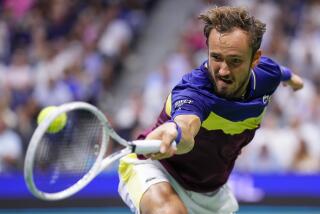Edberg, Sampras Go for Title and No. 1
- Share via
NEW YORK — Pete Sampras took the short way to the U.S. Open final, Stefan Edberg the very long way in a 10-hour tennis extravaganza.
Sampras, the 1990 champion, toppled No. 1 Jim Courier, 6-1, 3-6, 6-2, 6-2, in less than half the record five hours, 26 minutes it took 1991 champion Edberg to defeat Michael Chang, 6-7 (7-3), 7-5, 7-6 (7-3), 5-7, 6-4.
Edberg, ranked No. 2, could retrieve the top ranking with a victory over Sampras, who dashed off the court after finishing the match in obvious distress.
“He’s got some stomach problems,” Courier said. “It looked like he was in pain in the last game.”
Sampras, ranked third, would also move up to No. 1 with a victory today.
Courier blamed himself for the loss, claiming Sampras’ 11 aces didn’t make the difference.
“He didn’t serve that well. I played a really poor match,” said Courier, who had 38 errors to Sampras’ 26. “The first game I felt out of sync, out of rhythm. That’s probably the worst tennis I ever played in a big match. My serve never really allowed me to get into the rhythm I like.”
Courier, winner of the Australian and French opens, seemed unaware and unfazed that he would lose the No. 1 ranking.
“C’est la vie,” he said with a shrug.
Sampras was unable to talk about the match, referee Tom Barnes said, because of his stomach cramps.
The first semifinal was an epic.
Worn down by the Chang’s chases after volleys, flustered by his own inexplicable vulnerability on serves with 18 double-faults, Edberg came up with three gutsy shots at the end to close out his victory.
The first of those, a clean backhand volley, on his 254th charge to the net, brought Edberg back from break point to deuce. The second, a sweeping serve that Chang punched into the net, gave Edberg the first and only match point he needed.
He arched his back in his unique serving style, tossed the ball high, and slammed a 108-m.p.h. shot up the middle that Chang lunged at, barely caught on the top of his racket and pushed wide.
That closed out an endurance test longer than any match since the tiebreaker rule was introduced in 1970, breaking the record of 5:01 set a few days ago in Ivan Lendl’s five-setter over Boris Becker.
It was also the most games played in any U.S. Open semifinal since the Open era began in 1968.
“Anyone would be proud of what I’ve done here so far,” Edberg said after coming back from a break down in the fifth set for the third straight match. “I’ve been in a lot of trouble the past few matches and come out of it. I feel very good about myself. I’m playing good tennis. I’m fighting for my life out there and coming through.”
Chang felt the same way, even if he went away a loser.
“Today I knew even though I was up a break in the fifth, I was in a dogfight to the end,” said Chang, who led 3-0 in the final set but lost six of the next seven games. “I knew that one break was not that much, and if I didn’t serve that well, Stefan would have a chance to break my serve.
“I don’t look at it as if I was just giving him a good workout. I did my best and wanted to come out on top. It was a match that seesawed. In the end he was able to just pull out the tough shots and play the bigger points a little bit better.”
Edberg, who kissed the net cord Friday when a ball clipped it and popped over on a critical point, smacked it several times Saturday when it blocked his volleys.
Edberg was far from the composed, virtually perfect player who won his first U.S. Open title a year ago against Jim Courier.
Mental and physical fatigue took its toll on Edberg and Chang, who also played his third consecutive five-setter.
Chang looked more pumped up at the beginning, gaining three set points in 5-2 game of the first set and four more at 5-4. Each time Edberg held him off, but he couldn’t overcome a 6-3 deficit in the tiebreaker. In an exchange that was repeated many times, Chang whacked a backhand return that Edberg hit wide on a backhand volley.
Edberg charged constantly to the net, but of his 254 approaches he won only 144, many plunking into the net or going wide. His serves lacked the power and depth he showed last year and in winning Wimbledon and the Australian Open twice each. And he made 67 unforced errors, 28 more than Chang.
“It was really something today,” Edberg said. “I had chances. He had chances. It was incredible. I didn’t have enough on my serve. I was hitting way too many double-faults. Maybe I’ll feel better tomorrow.”
More to Read
Go beyond the scoreboard
Get the latest on L.A.'s teams in the daily Sports Report newsletter.
You may occasionally receive promotional content from the Los Angeles Times.









